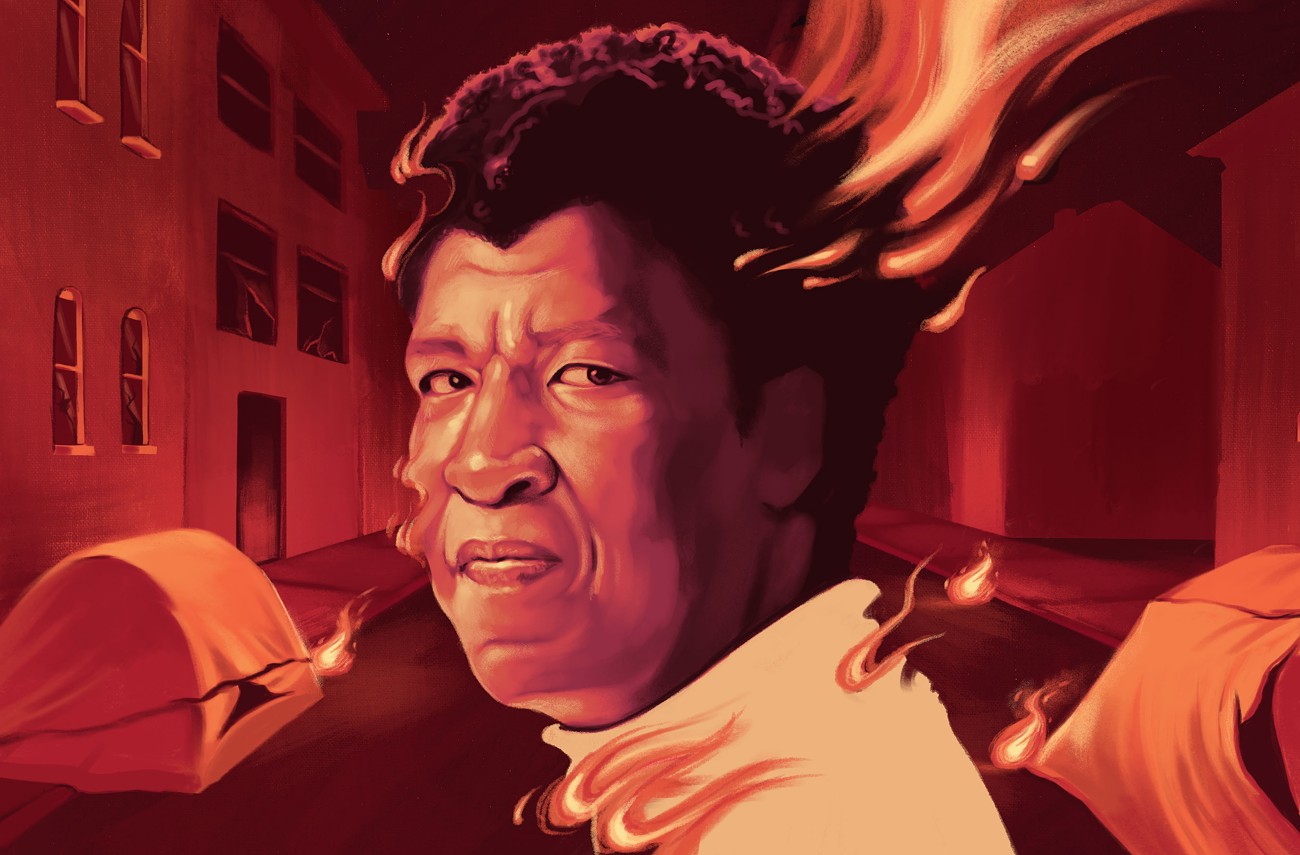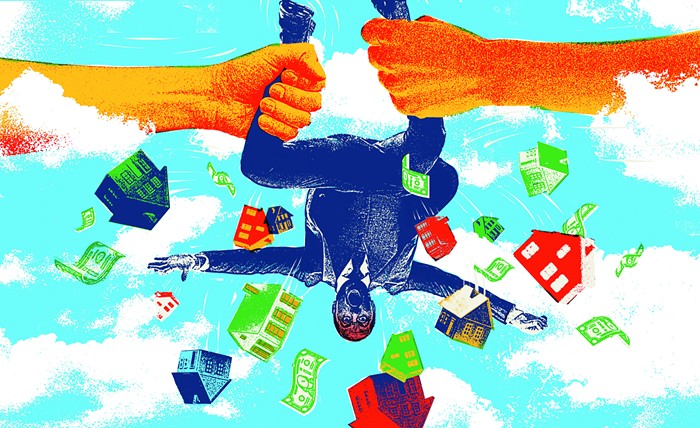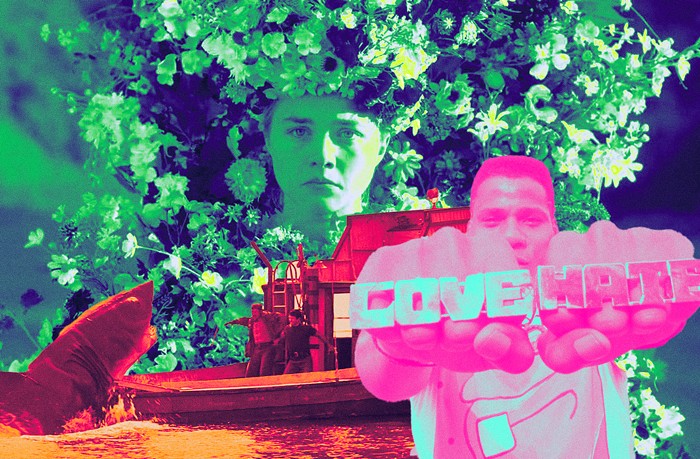How to Vote
Save the Country and Earn a Free Sticker While You’re at It
Flying the Freak Flag
Seattle’s Genre-Bending Beautiful Freaks Will Fight (and Bleed) for You
Swimming with Nikki McClure
Sometimes, When You Interview Your Favorite Artist, You End Up Becoming a Piece of Their Art
Octavia Butler Saw Our Doom
Parable of the Sower Is the Opposite of a Light Summer Read,but You Need to Read it This Summer Anyway
The Stranger’s Endorsements for the August, 6, 2024 Primary Election
Time to Make the Billionaires Pay What They Owe Us
Your Local Baseball Besties
Why You Should Give a Shit About the Mariners This Summer
Damn the Man, Save the Empire
Seattle’s Best Video Store Needs Our Help—Here are Eight Summer Classics to Rent Right Now
The Stranger's Summer Issue
Primary Endorsements! Cheat Sheat! Music Festival Faceoff! Chaos Ball! And More!
Every summer has become, for me, a window on a train that’s rushing toward a collapsed bridge. Everyone should be on one side of the air-conditioned cars—the side with windows that view the approaching void. Everyone will die real soon. But almost everyone is preoccupied with a phone, or a game of cards, or some food from the bistro car.
This train is, of course, our consumer-driven society; and the destroyed bridge ahead is, of course, the catastrophe of climate change. The summers keep getting longer and hotter, and extreme weather events are becoming more and more costly and deadly. Who will rescue us?
Shortly before World War II, the German philosopher Walter Benjamin, who inspired my image of the doomed train, wrote in a note he did not live to publish (he chose suicide over capture by the Nazis): “It is possible that revolutions are, for those of humanity who travel in [the] train [of world history], the act of pulling the emergency brake.” As it was then, it is now. Our only hope is the radical transformation of our society, but all we can do is wait until it’s too late. What happens after the end of the world that’s about to happen? The answer is found in a 1993 novel by Octavia Butler, Parable of the Sower.
We enter the year 2024. The American economy has been destroyed by rising sea levels, heat waves, violent storms, crop failure, and water shortages. “Tornadoes are smashing hell out of Alabama, Kentucky, Tennessee, and two or three other states,” says Lauren Oya Olamina, the Black teenage narrator of Sower, to her friend Joanne. “Three hundred people dead so far. And there’s a blizzard freezing the northern midwest, killing even more people.”
As for this: “According to the National Oceanic and Atmospheric Administration, Tennessee has endured at least 205 twisters since the start of 2020 (the statistics have not been updated yet in 2024). The memories of deadly storms in March 2020 and December 2023 still seem too fresh.” That’s from a real article, “Deadly tornadoes again rampage through Tennessee: ‘Lord please don’t let me die,’” that The Tennessean ran on May 9, 2024.
Our world and the fictional one in Sower are very close for a good reason: the novel’s author fully absorbed the climate science available at the end of the 20th century. Butler, in an interview presented at the end of the Kindle Edition of Parable of the Sower, said:
[For my research] I looked at global warming and the ways in which it’s likely to change things for us. There’s food-price driven inflation that’s likely because, as the climate changes, some of the foods we’re used to won’t grow as well in the places we’re used to growing them. Not only will temperatures be too high, not only will there not be enough water, but the increase in carbon dioxide won’t affect all plants in the same ways. Some will grow a little faster while their weeds grow a lot faster. Some will grow faster but not be as nutritious—forcing both their beasts and us to need more to be decently nourished. It’s a much more complex problem than a simple increase in temperature.
Butler’s brilliant literary imagination augmented this reality (or scientific knowledge) with descriptions of the cultural impact of the coming anthropogenic disaster. In Sower’s 2024, most Americans are “illiterate, jobless, homeless, without decent sanitation or clean water.” A few Americans, who are lucky enough to work, live in gated communities that can barely keep out thieves and fire-mad junkies. Law and order (meaning the police and other civil services) are only for the very rich.
And this is what’s truly terrifying about Parable of the Sower: The economic system that caused the catastrophe, that killed millions (if not billions) with its eternal drive for surplus value, still persists. Money has not lost its social power. Land is bought and sold. Life insurance policies are marketed. Indeed, capitalism has reverted to its older forms (collectively called primitive accumulation by trad-Marxists). Robber barons are back with a vengeance, and so are company towns (“I owe my soul to the company store”). And in the 2030s, the setting for the second novel, Parable of the Talents (of a trilogy Butler didn’t live long enough to complete, as she died in 2006 at the age of 58), even slavery is reanimated.
Capitalism’s grip on power in Sower’s post-apocalyptic dystopia is maintained by corporations based around the world and authoritarian American presidents who promise to revive the good old days. (The campaign slogan for the presidential candidate in Parable of the Talents, which was published in 1998, is “Make America Great Again.”) Capitalism also relies on Christofascism (“Oklahoma schools are required to teach the Bible,” Washington Post, June 27, 2024), racism (“Newsmax guest lobs a racist slur at Rep. Jamaal Bowman,” Media Matters, June 27, 2024), and the institutionalization of corruption (“The US supreme court just basically legalized bribery,” The Guardian, June 27, 2024).
The only ray of hope in this super-dark world is a new religion, Earthseed, that has Lauren Oya Olamina as its founder. For her, God can only be change.
Lauren to her friend Joanne:
“Did you ever read about bubonic plague in medieval Europe?” I asked. [Joanne] nodded. She reads a lot the way I do, reads all kinds of things. “A lot of the continent was depopulated,” she said. “Some survivors thought the world was coming to an end... What’s your point?” “The changes.” I thought for a moment. “They were slow changes compared to anything that might happen here, but it took a plague to make some of the people realize that things could change.”
In this theology of change, we hear not so much the echoes of the pre-Socratic Greek philosopher Heraclitus: “No one ever steps in the same river twice, for it’s not the same river and the person is not the same person.” More important, and this reading is supported by Butler’s obvious observance of genetic change, are the echoes with the thinking of evolutionary biologist James A. Shapiro. His 2011 book, Evolution: A View from the 21st Century, contains a chapter titled “Can Genomic Changes Be Linked to Ecological Disruptions?” that sounds just like Butler. Her prophet’s theology (and warning to humankind) is written all over these words by Shapiro: “...little attention has been paid to the relationship between ecological disruption and genetic change. The influence that stimulus-sensitive regulatory processes and changes in population structure may have on the processes of genome restructuring requires greater scrutiny.”
By way of a religion, Earthseed, that’s truly pro-life, the humans in the last pages of Butler’s novel are finally ready to undergo the kind of radical cultural change that’s desperately needed in the train described at the opening of this article. Welcome to how our only world ends. It will be like this every summer: getting worse, and worse, and worse until there’s nothing worse left.
“Is it just my imagination, or does the Puget Sound region have fewer days with marine clouds than we had years ago?” –My Northwest, June 26. Read all about it in Parable of the Sower. ν




















